USAID budget cuts threaten global health programs and increase preventable deaths worldwide
The USAID budget cuts threaten global health programs, increasing preventable deaths and worsening humanitarian crises worldwide. Experts warn that this decision could undo years of progress in public health and food security.

The recent decision by President Donald Trump to freeze international aid for 90 days and shut down the United States Agency for International Development (USAID) has raised global concerns. This measure directly affects essential health and humanitarian assistance programs in various regions, putting millions of lives at risk.
For decades, USAID has been a key player in foreign aid, managing approximately $44 billion in global assistance in the last fiscal year. Its programs cover everything from biosecurity and vaccination campaigns against diseases like polio, mpox and Ebola to food distribution in famine-affected areas and HIV treatment initiatives. The sudden interruption of these efforts could lead to a significant rise in preventable diseases and deaths.

USAID's reproductive health funding has saved millions of lives. Now it's gone. Photo: Louisana Illuminator.
Impact on health and food security programs
The suspension of funds has halted critical public health projects. For instance, vaccination campaigns and infectious disease control efforts have been put on hold, increasing the risk of epidemic outbreaks. Additionally, food distribution in regions suffering from malnutrition has been disrupted, worsening existing hunger crises. USAID officials have expressed concern, warning that these actions could undo years of progress in global health and food security.
The international community has voiced alarm over these decisions. Organizations like the World Health Organization (WHO) and humanitarian groups have criticized the move, arguing that cutting funding for crucial programs could create long-term global instability. Many countries that rely on USAID support for essential healthcare services and emergency relief are now struggling to fill the gaps left by these cuts.
What’s next for global aid?
Despite these cuts, some organizations and lawmakers are working to restore funding to essential programs. Advocacy groups are pushing for emergency legislation to reinstate key USAID initiatives, emphasizing the dire consequences of leaving vulnerable populations without support. “We've probably lost lives,” Marcia Wong, who served as deputy assistant administrator of USAID's Office of Humanitarian Assistance under the Biden administration, said in an interview earlier this month.
As the global community watches closely, the future of U.S. foreign aid remains uncertain. Whether these cuts will be reversed or expanded in the incoming months will determine the extent of their long-term impact on global health and humanitarian efforts. Experts argue that beyond the immediate humanitarian impact, these reductions in aid could also affect diplomatic relations and global security. By withdrawing funding from critical programs, the U.S. risks weakening its influence in key regions and diminishing its role as a global leader in humanitarian efforts.












